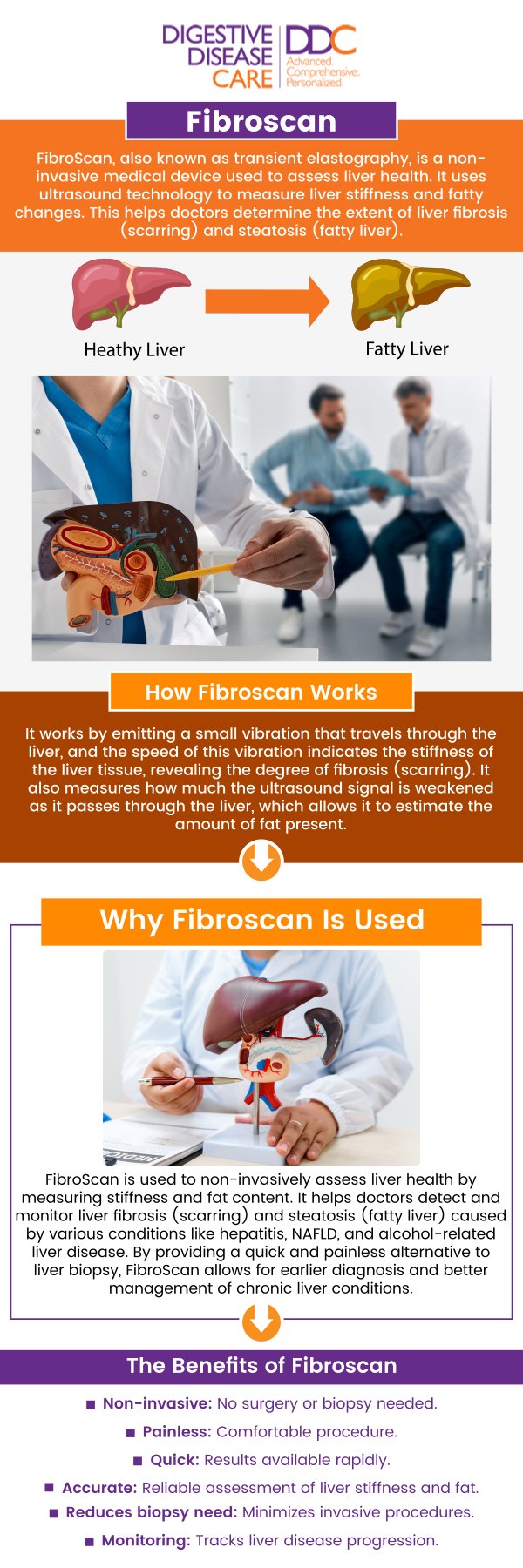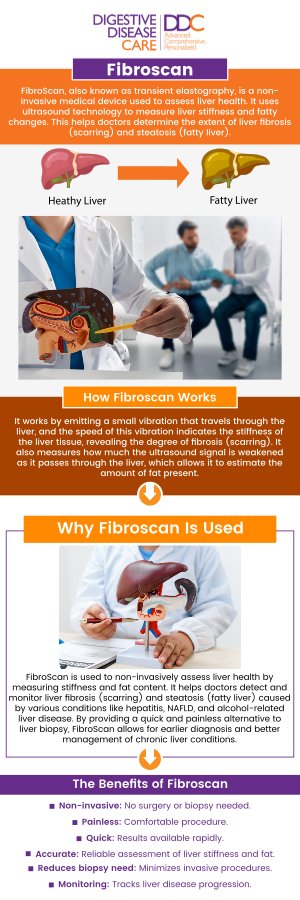Understanding the Stages of Cirrhosis
Understanding the stages of cirrhosis is crucial for early detection and management. As the liver progressively scars, it moves through stages from compensated cirrhosis, where symptoms may be mild, to decompensated cirrhosis, where severe complications like fluid buildup and confusion can occur. Timely intervention can help manage symptoms and prevent further damage. At Digestive Disease Care, our gastroenterologists provide care to monitor liver health and support patients throughout each stage. For more information, contact us today or schedule an appointment online. We have convenient locations to serve you in Babylon NY, East Setauket NY, Forest Hills NY, Jericho NY, Lake Success NY, Melville NY, Mineola NY, Massapequa NY, New Hyde Park NY, and Riverhead NY.


Table of Contents:
What are the different stages of cirrhosis?
How is cirrhosis diagnosed in its early stages?
Can cirrhosis be prevented?
How can cirrhosis be managed in advanced stages to prevent further damage?
Cirrhosis is a progressive liver condition that develops over time as healthy liver tissue is replaced by scar tissue, limiting the organ’s ability to function properly. It usually results from chronic liver injury due to factors such as hepatitis, alcohol misuse, or fatty liver disease. The condition moves through defined stages, each representing the severity of liver damage and symptoms. Early detection is crucial because treatment can help slow progression and prevent complications.
The stages of cirrhosis are generally categorized into four phases:
1. Compensated Cirrhosis (Stage 1)
At this stage, liver scarring has begun, but the liver still performs most of its essential functions. Many individuals may not experience noticeable symptoms, though fatigue or mild abdominal discomfort can appear. With lifestyle changes and medical monitoring, progression can sometimes be slowed.
2. Compensated Cirrhosis with Varices (Stage 2)
Scar tissue worsens, leading to higher pressure in the portal vein (portal hypertension). This may cause varices—enlarged veins in the esophagus or stomach that can bleed. Symptoms such as swelling in the legs or abdomen (edema, ascites) may start to appear.
3. Decompensated Cirrhosis (Stage 3)
Liver function significantly declines, and complications become more evident. Common issues include jaundice (yellowing of skin and eyes), ascites, variceal bleeding, and hepatic encephalopathy (confusion due to toxin buildup).
4. End-Stage Liver Disease (Stage 4)
At this point, the liver is severely scarred and can no longer sustain vital functions. Patients may suffer life-threatening complications and are often evaluated for liver transplantation as the primary treatment option.
Cirrhosis can be difficult to diagnose in its early stages because symptoms are often mild or absent. However, timely detection is important to slow progression and prevent complications. Physicians typically rely on a combination of medical history, physical examination, blood tests, imaging studies, and sometimes liver biopsy to confirm the diagnosis. Individuals at risk, such as those with chronic hepatitis, alcohol misuse, or fatty liver disease, should be monitored regularly for early signs.
Several methods are commonly used to detect cirrhosis early:
1. Medical History and Physical Exam
Doctors review risk factors such as alcohol use, viral infections, or metabolic disorders, and may check for early physical signs like mild liver enlargement.
2. Blood Tests
Liver function tests (ALT, AST, bilirubin, albumin) can show abnormal enzyme levels, while platelet counts and clotting tests may indicate early liver stress.
3. Imaging Studies
Ultrasound is often the first imaging tool to detect liver texture changes. Advanced scans like CT or MRI can reveal scarring or portal hypertension even before symptoms appear.
4. Elastography (FibroScan)
This noninvasive test measures liver stiffness, helping identify fibrosis or cirrhosis without the need for surgery.
5. Liver Biopsy
In uncertain cases, a biopsy may be performed to directly examine liver tissue and confirm the degree of scarring.
6. Screening in High-Risk Groups
Routine checkups for people with chronic liver conditions ensure earlier detection, even when no symptoms are present.
Cirrhosis cannot always be completely prevented, but many of its leading causes can be managed or avoided with healthy lifestyle choices and regular medical care. Since cirrhosis develops over years from ongoing liver damage, prevention efforts focus on protecting the liver from harmful exposures and treating underlying conditions early. Taking proactive steps can greatly reduce the risk of cirrhosis and promote overall liver health.
Key preventive measures include:
1. Limit Alcohol Intake
Excessive alcohol use is one of the most common causes of cirrhosis. Drinking in moderation—or avoiding alcohol entirely—helps protect the liver.
2. Maintain a Healthy Weight
Obesity increases the risk of nonalcoholic fatty liver disease, which can progress to cirrhosis. Balanced nutrition and exercise support liver health.
3. Prevent Viral Hepatitis
Vaccinations for hepatitis A and B, practicing safe sex, and avoiding shared needles reduce the risk of viral hepatitis, a major cause of cirrhosis.
4. Manage Chronic Conditions
Properly controlling diabetes, high cholesterol, or other metabolic issues lowers strain on the liver and decreases long-term damage.
5. Avoid Harmful Substances
Limiting unnecessary medications, avoiding illicit drugs, and being cautious with herbal supplements protect the liver from toxic injury.
6. Routine Checkups
Regular blood work and imaging tests for individuals at risk allow early detection of liver changes before cirrhosis develops.
By following these preventive strategies, many cases of cirrhosis can be avoided, and those already at risk can slow the progression and preserve liver function.
In advanced stages, cirrhosis cannot be fully reversed, but it can be managed to prevent further liver damage, control complications, and improve quality of life. Treatment focuses on addressing the underlying cause, slowing progression, and managing symptoms that arise from reduced liver function. Patients at this stage often need close medical supervision and lifestyle adjustments, and in severe cases, liver transplantation may be considered.
Key management strategies include:
1. Treating the Underlying Cause
Managing hepatitis, controlling alcohol use, or treating fatty liver disease can help slow further damage even in advanced cirrhosis.
2. Medications for Complications
Diuretics may be used for ascites (fluid buildup), beta-blockers to lower portal vein pressure, and lactulose for hepatic encephalopathy.
3. Lifestyle Modifications
Avoiding alcohol, reducing salt intake, eating a balanced diet, and maintaining proper hydration support overall liver health.
4. Monitoring and Screening
Regular checkups and imaging are essential to detect liver cancer (hepatocellular carcinoma) and monitor varices or worsening symptoms.
5. Managing Infections and Bleeding Risks
Prompt treatment of infections and endoscopic procedures for varices help prevent life-threatening complications.
6. Nutritional Support
A diet rich in protein (unless otherwise restricted), vitamins, and minerals helps manage malnutrition, which is common in advanced stages.
7. Liver Transplant Evaluation
For patients with end-stage disease, transplantation may be the only option to restore liver function.
Cirrhosis management is available at Digestive Disease Care. For more information, contact us today or schedule an appointment online. We have convenient locations to serve you in Babylon NY, East Setauket NY, Forest Hills NY, Jericho NY, Lake Success NY, Melville NY, Mineola NY, Massapequa NY, New Hyde Park NY, and Riverhead NY.

Check Out Our 5 Star Reviews


Additional Services You May Like

Additional Services You May Like
- Abdominal Pain
- Acid Reflux
- Barretts Esophagus
- Bloating
- Capsule Endoscopy
- Celiac Disease
- Colon Cancer Screening
- Colonoscopy
- Constipation
- Crohns Disease
- Diarrhea
- Diverticulitis
- Esophageal PH Monitoring
- Fatty Liver
- Fibroscan
- Gallstones
- Gastroenterologist
- Gastric Chest Pain
- Gluten Intolerance
- Hemorrhoid
- Hemorrhoid Banding
- Hepatitis
- Irritable Bowel Syndrome
- Lactose Intolerance
- Pancreatitis
- Polyps
- Rectal Bleeding
- Stomach
- Ulcerative Colitis
- GI Urgent Care





